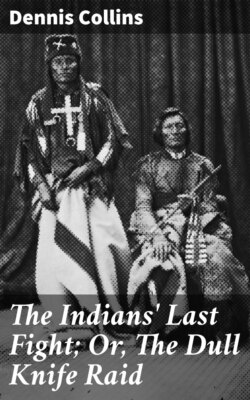Читать книгу The Indians' Last Fight; Or, The Dull Knife Raid - Dennis Collins - Страница 11
На сайте Литреса книга снята с продажи.
ОглавлениеSour-dough Charlie had a little ranch of his own on Wolf Creek where he kept a few horses. He raised a few colts each year, and to fill in his odd time he tanned deer skin, made gloves for the cow punchers, and at times used to cook for a round-up as he was an artist in that line of work as well as being a very entertaining fellow. His chief work of art was the construction of sour dough bread and he had the reputation of being a master in the work. One afternoon a cow-puncher pulled up to the wagon and called for his chuck-a-way, and said he wanted it at once as he had to return to the herd and stand guard while his partner came for his supply. The cook told him he would have to wait for awhile as he did not have things in shape to get an extra meal. Without further parley and without any warning the puncher picked up a crock full of sour dough and struck the cook over the head with it. The contents spilled over his head and ran down into his eyes and mingled with his whiskers. Right then and there was originated and conferred upon him the title of “Old Sour-dough Charlie,” a name that will remain with him as long as he lives.
Nicknames and titles, in this county, amount to about the same thing although conferred in different ways according to conditions. The man who succeeded in accumulating a herd of cattle amounting to one or two hundred was given the name of Captain. If he acquired five or six hundred, he was addressed as Major, and a man who through good management and perseverance numbered his stock by thousands became the “Old Colonel.” There was one very noticeable change in the habits, manners, customs and character of the men who had acquired the title of Captain, Major, or Colonel, and that was shown in their dress. The styles of their garments differed, they dispensed with the snake-skin band, they changed their underwear, frequently had their whiskers trimmed and hair cut, and occasionally became a power in local politics. The question was never asked when and how these men became possessed of such large herds in such short time, but to the old-timer it was plain that the Old Colonel was a great business man, or was an expert with the lariat and an artist with the branding iron.
How different is the conferring of titles in foreign lands, especially in Great Britain, where titles have to be ratified by supreme authority and approved of by local potentates, and even there we find some titles resting on tottering foundations and others hang by a very slender thread which is liable to part at any time and leave the possessor in a pitiable mass of social wreckage. The ceremonies on such occasions are calculated to dazzle the eye and deceive the judgement of the spectator. The sleight-of-hand performer and the street fakir practice the same system and the man with the three-shell game and the three card monte man are all on the same level, but Royalty claims age and dignity wherever you find it. When Capt. Drake returned to England after his expedition of murder, plunder, and piracy, and his arrival was announced to the Good Queen Bess who was on the throne at the time, she at once called for a royal banquet to be held on board his vessel. After rounding up all her Royal roustabouts, flunkeys, and followers, she proceeded direct to the ship where she was going to preside in state until she had knighted the Capt., whose hands were still red with the blood of his murdered victims. When the time for the ceremony was at hand, at a motion of her magic wand the Captain dropped to his knees at her feet to receive the power and authority to take and keep any property on the seas that he felt like confiscating; which meant any that he might be able to lay his hands on. The ceremony consisted of laying the sword of authority across his bald pate and telling him that henceforth he was at liberty to do as he pleased and that he should remain her loyal subject. She then commanded him to arise and he did so, but was so dazzled with the great honor conferred upon him that I do not suppose he could tell whether he was a duck or a drake.
A prince can make a belted Knight,
A Marquis, duke, and a’ that,
But an honest man’s aboon his might,
Good faith he muna fa’ that.
The price of titles, like other commodities, depends greatly upon the locality where they are granted. In England, the title cost Sir W. Raleigh his head; in Texas, a title cost Sour-dough Charley but a few loaves of bread. Imagine the difference.
